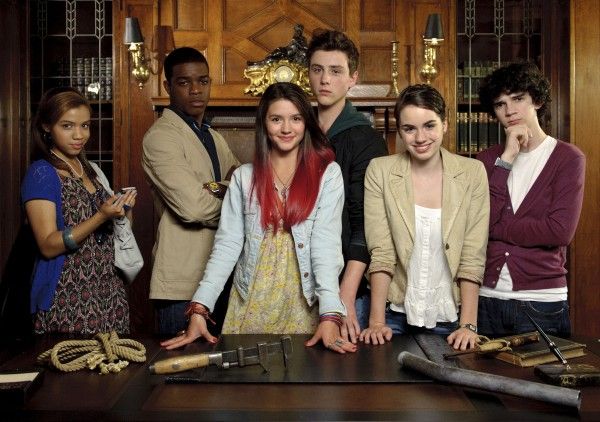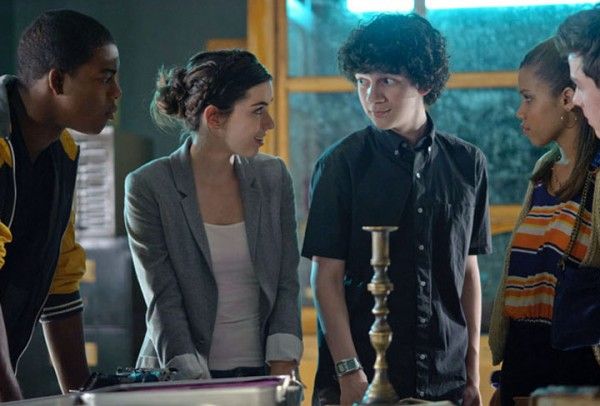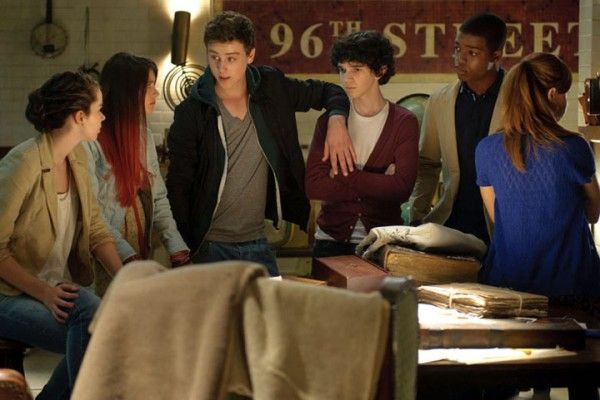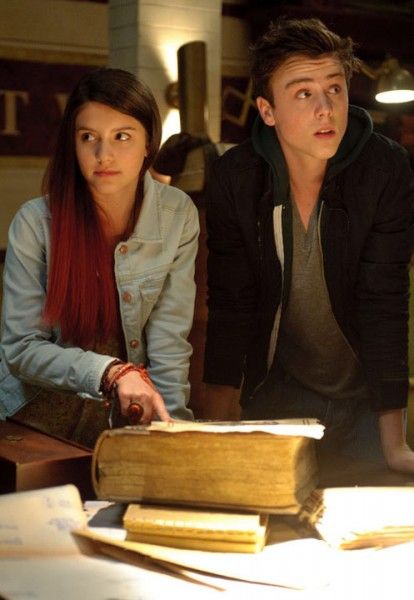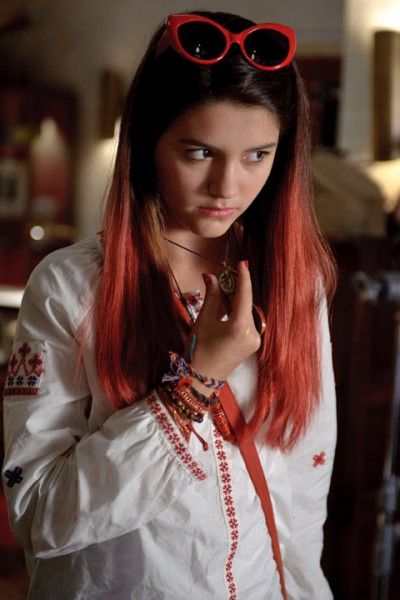Clue – based on the iconic board game, and featuring its characters, weapons and locations – is a five-part, live-action mini-series event from the new family network The Hub. Premiering on November 14th and airing daily through November 17th (and then airing as a back-to-back marathon on November 19th), the series follows six teenaged sleuths who stumble upon an adventure they never imagined, after witnessing a crime. Along the way, these crime-solvers uncover hidden treasures and decipher cryptic knowledge to reveal a secret society, and the mystery that they unravel could define their own futures.
During this recent exclusive phone interview with Collider, executive producer/writer/show runner Raven Metzner talked about developing this younger version of the characters, relating each of these characters to their board game counterparts, the involvement that Hasbro had with their property, finding the right young actors for this cast, and hoping that he’ll get to do another set of episodes. Check out what he had to say after the jump:
Question: How did this mini-series come about? Did you come up with the idea, or were you approached about doing it?
RAVEN METZNER: I was approached with the idea of turning Clue into a TV show for The Hub. That was the original impetus. There had been other writers who had taken stabs at it, who had different ideas for it. Then, I decided to put a take together, which was very much like what you see with this, and they let me go for it.
Knowing how much people love the original movie, did you intentionally make this mini-series very different from that?
METZNER: I meet a lot of folks who are big fans of the original movie, and yeah, it is a bit of a departure. We tried to create a tone that was very different than the movie. I didn’t really want to touch the movie because people love it for what it is, so this is very different, but still very Clue.
Was the starting point for this making these characters young and modern-day?
METZNER: Yeah, that was the key. There were two things that were my way in. Number one was the characters. I have a 15-year-old son, and his friends are always around and in my life. I just drew on them. Also, I was a big fan of the game growing up, and the thing that I really remembered about playing the game was arguing with my sisters about who I got to be. I was like, “I’ve gotta be Plum,” and my sister was like, “No, I’m Plum.” Those were two things that came together for me. I was like, “Well, it’s gotta be about these characters,” but I knew I didn’t want to have characters literally named Miss Scarlet or Colonel Mustard or Mr. Green. I thought, “Maybe there’s a way to take those archetypical Clue characters and infuse them into kids that I know, and kids that talk the way that kids I know talk, and act the way that kids I know act.”
That was the first thing. The other thing for me was the Clue weapons. I just love them. I think they’re amazing. I don’t love some of the newer ones, but I love the original ones. I just thought to myself, “Wow, those six weapons are so cool. What if there was this room that had a thousand things as cool. And, what if they weren’t just murder weapons. What if they were mysterious items.” So, I just started making a list of things I would want to see and what kind of mysteries could unfold out of them. The characters and a room full of objects became the starting place.
Was it challenging to figure out how to work in mentioning the relation of each character to the board game characters?
METZNER: It wasn’t really hard. To me, the fun part was coming up with that stuff. The challenge there is that you want to do justice to the board game and the brand. You have to make sure that the ideas are really sound enough and fun enough that they can live up to that. I knew that Dmitri played a game that had something to do with Mustard. You have an idea, and then it all comes together. I worked really hard on those, but I enjoyed it. It was fun.
In dealing with an established property like this, is there a freedom in the board game not having an inherent backstory?
METZNER: Well, I created a gigantic backstory for this property. For the past couple of years, already branded concepts are much easier to set up than something new. That’s not so much about the backstory having to be there or not be there, but it’s more about an audience already coming to it with an expectation for something that they love. People love to play the game Clue. It’s a very popular board game. That’s already a given. If I had created a show called Mystery Kids, then it wouldn’t have the same draw. The fun of a brand is more about having that recognition and figuring out what to do with it. Believe it or not, there is a pretty gigantic, established backstory to the Clue board game. If you look on Wikipedia, you’ll be surprised at how the brand has done a very good job at making a whole mythology. I just made a new one.
What was Hasbro’s involvement, as far as how they want their characters represented? Did they give you any input or guidelines to follow?
METZNER: The first impetus for me came from The Hub, and not Hasbro. I really like The Hub’s impetus, as a channel. They told me that they don’t want to make “kids” television. They want something that is a co-viewing proposition, which is a fancy way of saying that they want family viewing, like the way a Spielberg movie used to be. They want an Amblin Entertainment type of thing, where the whole family can sit around and watch a show, and the parents aren’t going to feel like they’re being forced to watch something, and the kids can enjoy it too. When they told me that, I was like, “That’s great!” I had never written for a younger audience before, and that got me excited. They were very, very open with letting me run with it.
Hasbro really cares about their brand properties, and I actually got to go up there to a Clue summit. It was really interesting to see how they generate ideas for games and for the brand. They’re very hands-on, only in terms of wanting to be a part of the aspects that are going to touch the game or change the game. For example, they created these cool insignias, and we remodeled the insignias, so they were active in that because they are going to be something that they might want to use, going forward. It started with The Hub, and Hasbro was very involved, but they were more about protecting the brand, as a whole, whereas The Hub gave the first step, as to what the tone of the show should be.
What was the casting process like for this? Was it challenging to find actors who could play each of these characters?
METZNER: It was really challenging, and there were times when I was convinced that we would never be able to do it. Ensemble casting is hard because you have an idea in your head of what you want, and then, once you cast one person, everything changes. You start pasting your headshots on the wall and looking at the two people you’ve got, and then going, “Okay, now that I have these two actors, how are they going to work with this person and that person.” It’s this very, very hard process. But, with these kids, for the most part, when each one of them walked into the room, I got excited. It was equally their acting talent and just who they are.
When Zach Mills walked in the room, I hadn’t seen Super 8 yet, but before he even opened his mouth, I was thinking, “Please let him be able to act!” And then, he was a fantastic actor. Before he walked out, I just turned to my casting directors and said, “We have to do everything we can to get him. He’s Lucas.” A lot of our cast really surprised me. Stephan James is a fantastic Dmitri, but he’s much more approachable than the Dmitri that I had imagined. I thought Dmitri was going to be much more full of himself, and Stephan is not. He’s awesome. Same with Ana Golja, who plays Liz. That character was supposed to be much more of an airhead. Ana Golja is a phenomenal actress, and she is extremely serious about her craft, and she brought that to the character. All of a sudden, I was rethinking my characters with these kids in mind.
Are you hoping to get to do more episodes of Clue and explore more mysteries with these characters?
METZNER: Yeah, that’s very much part of the plan. As we speak, I’m sitting here, putting together what I hope to be another round of Clue.
Do you enjoy writing for both film and television, and getting to tell self-contained stories for film while getting to explore characters in a more ongoing way for television?
METZNER: Yeah, I think that it is fun to be able to do both. It’s hard to say which is more enjoyable. It really depends on your personality type. The thing that makes television more enjoyable for me is the producing aspect. Most screenwriters are not producers. The director takes over and is in charge of the project, and maybe you’re invited to set or allowed to have input, but you’re not really part of it. With Clue, I wrote these scripts, and then I was part of everything. Down to the stickers on their phones, I was part of everything and made all the choices. That is why I got into screenwriting, in the first place. I used to love drama class and being in the theater, and it feels like that, when you’re surrounded by incredible production designers, wardrobe people, actors and a director, and you’re sitting with the editor. It’s hands-on filmmaking. So, while I do love movies and I love telling self-contained stories, there’s a epic swoop that you can get from a movie that you can’t do in television, but making TV is so much more fun. At least for the writer. I don’t know if it’s as much fun for the director, but we got lucky with our director. Terry McDonough (Breaking Bad) is fantastic. He was so incredibly collaborative and generous, and his style is all over this show. He really gave it its style. We talked about the tone endlessly, and he just made it happen.

